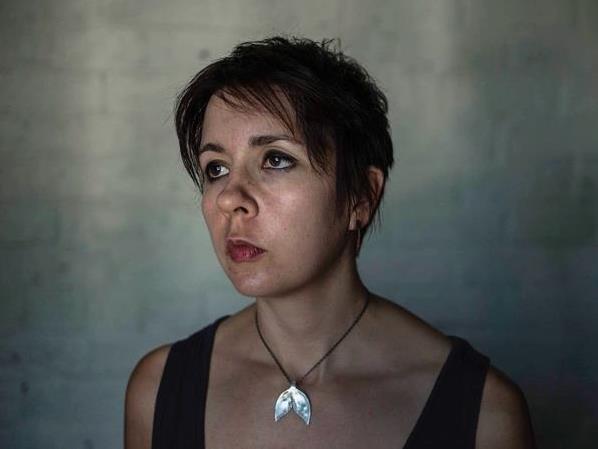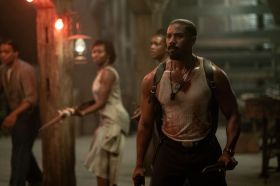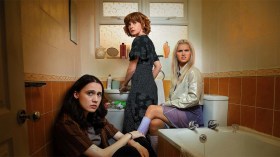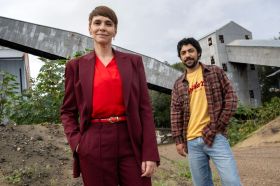When cinematographer and artist Meg White thinks of her anxiety, she pictures it as an octopus: tenacious and adaptable. ‘I think they’re incredible creatures,’ she says on the phone to Screenhub, ‘but they’re also these bizarre alien things. Their evolutionary path is very unique and different to the rest of the organisms on earth.’
White is explaining the eerie and disturbing photographs she’s created for her exhibition LoveSick (29 April – 13 May, Aro Gallery, Darlinghurst, NSW) in which the creatures appear, splayed and contained within pastel-coloured bathtubs. Bathtubs have an iconic and macabre history in pop culture, a place of refuge, cleansing and comfort, but also of self-harm.
‘I wanted the bathtubs to be both a boundary and a birth place,’ she says. ‘I chose this metaphor myself and created these beautiful striking images that maybe other people can relate to. I also wanted to play with the mythology of the Kraken and draw parallels between this sea-dwelling beast and the one within, and further still, the mythologies and misconceptions surrounding mental illness.’
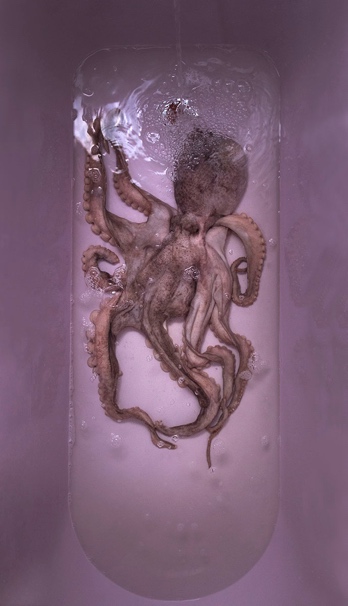
Image: Photograph from Meg White’s Lovesick exhibition. Supplied.
White’s extensive filmography of credits, awards and scholarships gives no indication of a person struggling with the tentacles of mental illness. Perfectionism, anxiety and depression often accompany high achievements, tangled up in the driven personalities that accomplish great feats.
White says that yes, she would describe herself as a driven person, and yes, sometimes her anxiety does make her try harder, work better, push for excellence in her art and her work. But in the past, before she understood the beast in her bathtub, there were times when anxiety just paralysed her, sucking all pleasure and peace out of life, and tempting her to self-medicate with alcohol.
‘I definitely bury myself in work to distract myself, but what I noticed is that when my anxiety was fully switched on, it did kill my creative impulses. It was a detriment. I wanted to work as a distraction, but it muted my ability to be creative. It was a double-edged sword.’
In the ten years since she graduated with a Bachelor of Media Arts Sydney’s UTS, White has shot numerous award-winning shorts and television commercials. She’s worked in camera departments on international features including The Wolverine and The Water Diviner, and on television projects like Redfern Now and The Letdown. Mentored by heavyweight cinematographers Mark Wareham ACS and the late Andrew Lesnie ACS ASC, she was recently the cinematographer on Remedy, a music video for Marcia Hines directed by Russell Crowe, which won an ACS Silver award, and was cinematographer on Rachel Perkins’ Arrernte Women’s Project.
Earlier this year, White was named the inaugural recipient of the Screen Australia OnBass Fellowship, a full tuition scholarship for emerging Australian filmmakers to attend the American Film Institute (AFI) Conservatory in LA to undertake a two-year Master of Fine Arts in Cinematography. (Alumni include no less than Terrence Malick, Janusz Kaminski and David Lynch).
White says it’s enormously exciting to be moving to the world hub of the film industry, an industry she’s been tempted to abandon in the past. ‘Even though I’ve been incredibly lucky, and worked on some big projects, I wouldn’t necessarily say it’s an economically viable career.’
That’s part of the problem.
An industry that’s bad for mental health
Working in the small scale Australian screen industry can be a recipe for disaster ‘for anyone who really needs routine and the knowledge that there’s going to be a pay check at the end of the month.’
‘This industry, the nature of irregular freelance work, not knowing when stuff is going to happen, that definitely contributes to anxiety,’ she says. ‘I did actually question whether for my health I should get out of this industry. It’s not a healthy industry at all for anyone who’s predisposed to mental health conditions.’
For this reason, she most values working on those sought-after feature film projects, ‘because at least you know that for two months you’ve got that job and you’re going to be with these people, and there’s a sense of security and a continuous family working environment.’
Anxiety: not stress and not depression
If there’s one thing White would like people to understand about anxiety, it’s that it’s a very different animal from ordinary stress. and a different disease to depression. They can, and do, often all occupy the same cage, ‘but when anxiety is switched on, it’s like that terrible feeling of something awful about to happen and you can’t stop thinking of all the worst case scenarios. It’s beyond logic, that dread in the pit of your stomach.’
Back in the period of 2014 – 2016 when she experienced the worst bout of anxiety in her life, she says it ‘felt like it was always latching on to me keeping me down, and yet it was really adaptable and intelligent as well, like it would evolve with the situation.’
Thus the octopus metaphor and the photographs. ‘I see LoveSick as a visual purge of this personal experience, a necessary catharsis for me both contain and recognizes the process of anxiety and where it sits within my life,’ she says.
Right at this moment, she is stressed and ‘under the pump’ before leaving for LA, but not suffering a bout of anxiety.
‘Often when I tell people I suffer from anxiety, they say, “Oh yeah, stress, I know, I get stressed too.” But anxiety is different. The severity of anxiety gets a bit dismissed because it’s not an immediate thing. It’s not like having a physical illness where people can see that you’re unwell. I think a lot of people are very good at hiding it, managing it and internalizing it.’
White also says she’d like people to understand the distinction between anxiety and depression, which she has also suffered. ‘Anxiety brought me down but it did it in a different way to the way depression would. With anxiety, I never felt I wanted to kill myself. I just wanted to not be conscious. I wanted to go to sleep and not wake up, not because I didn’t want to live, but because I wanted to get away from my thoughts. I know anxiety and depression do crossover very much, but they’re different.’
Wrestling the Octopus
These days, White manages her anxiety, mainly through understanding and accepting it. Creating a visual metaphor for it, and turning it into photographic art has been part of that process.
‘I don’t think you ever really get rid of it, but I know it’s a cycle in my head, and so I’m able to harness it better, to grab hold of it before it takes me over,’ she says.
Prioritising her mental health after a crisis helped her get back on track:
‘I had to take a step back with my career in 2016 and took a DIT assist job on Alien Covenant as I knew I had to address my mental health. I knew I need three things: routine, secure income and to be surrounded by people. There were a lot of people I knew on that set already. It was at this point I was drinking a lot and starting new medication so it was important I always had something to go to in the morning otherwise I wouldn’t have gotten out of bed. Though I was shooting and been getting interviewed for projects, the work days were too sporadic at the beginning of the year and I was spending too much time by myself which for me at that point was one of the worst things I could do. I swallowed my pride for my health.’
Meg White’s tips for dealing with anxiety:
- Talk about it. It’s easy to get isolated, particularly as a cinematographer. I think we’re slowly getting better at talking about it at work without the stigma.
- Be aware that you have anxiety. Don’t try to ignore it or self-medicate through drinking, which can then just contribute to depression.
- Look at what parts of the industry might be better for you if you’re predisposed to anxiety. It might not be the cool freelancing. You don’t have to be a freelancer.
- Look at your body and your health holistically. For example, I’m very hypertensive and now I’m on blood pressure medication that helps with physiological symptoms of anxiety.
- Embrace the uncertainty. Perhaps for things that are intangible or beyond your control, envision this as a more concrete form which may allow you to mentally grasp or manage those inconsistencies in your life.
Acknowledging the positives of anxiety
White says that it’s important to remember that people who wrestle with anxiety can be great assets in a crisis and in a creative workplace. She recommends this article from Vice.
‘I’ve had that said to me that I’m very calm on set, and yet my mind can be going a million miles an hour. I think it actually makes me better at my job because I’ve had to manage stressful worst case scenarios in my head so when the shit does hit the fan I’m really prepared for it!’
‘A lot of people who battle or try to manage a mental illness are stronger in other ways. It can make you more empathetic, and sensitive, and help you respond to things in other ways, and that’s got to be an asset in and an industry that’s creative and telling stories about the human experience.’
